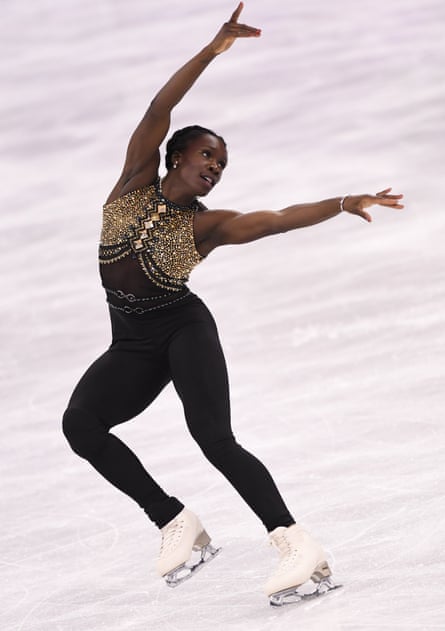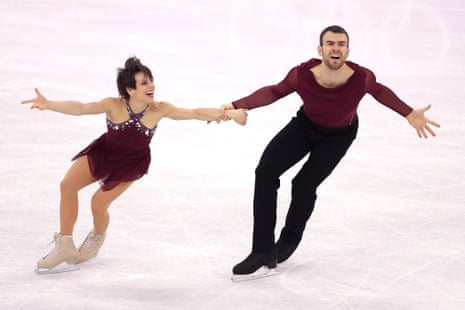As the emotive piano line of Adele’s Hometown Glory burst through the stadium, Eric Radford landed a perfect triple lutz. The Canadian figure skater was midway through a breathtaking routine with his pairs partner Meagan Duhamel at this month’s Winter Olympics in Pyeongchang, South Korea. As the song reached its heart-wrenching final chorus, with belted lyrics about the emotional conflicts of leaving home for the first time, Radford stretched his arms aloft, and his face cracked into a wide smile of pure joy. Their performance won first place, making him the first voluntarily out gay man to win Winter Olympics gold. “That song resonates with [me and Meagan] so powerfully,” says Radford, who growing up was the only figure-skating boy in his small, ice-hockey-mad Ontario town. “It had a powerful impact on the audience, but it had a powerful impact on ourselves as well.”
In the buttoned-up world of figure skating, even Magic FM staples are a shock to the system. This year’s Olympics were the first to allow skaters to compete to songs with lyrics, in the wake of a 2014 rule change partially aimed at reviving interest in the sport. In South Korea, some skaters stuck to the classics – Swan Lake et al – but others embraced new possibilities head on, pairing their triple axels and salchows with songs from Top 40 artists such as Ed Sheeran and Lorde, or choosing showstoppers from musicals Hamilton and La La Land. Perhaps inevitably, Luis Fonsi and Daddy Yankee’s omnipresent 2017 hit Despacito cropped up in three routines.
“Many of skating’s favoured classical and operatic pieces have become tired warhorses,” says the Olympic-sports journalist Philip Hersh. “The best thing about the rule change is giving the skaters the opportunity to ditch them.” Cue a big injection of personality to many routines in Pyeongchang: French skater Maé-Bérénice Méité vividly twirled to Beyoncé’s pro-women anthem Run the World (Girls), while Russian duo Evgenia Tarasova and Vladimir Morozov sauced up the ice to the tooting horns of Christina Aguilera’s Candyman. Not all the choices worked quite so well. German skater Paul Fentz dancing to Paul Anka’s jazz cover of an Oasis classic led one Twitter user to lament: “Play this version of Wonderwall in the lobby of my funeral.” But either way, the introduction of loved – or loathed – familiar songs has made it easier for casual Games fans to connect with skating this year.
For a sport dragging its blades into the modern age, the rule change helped to create an atmosphere of openness, where LGBTQ athletes were comfortable reflecting the fullness of their identity while competing. Take the bronze-winning American figure skater Adam Rippon. He’s the first out gay American athlete to qualify for a Winter Olympics, has been cheered on by Britney Spears and Reese Witherspoon, and has a knack for one-liners to rival Bette Davis. His self-assured, fluid performance was a watershed moment for LGBTQ representation on ice, and won him a team bronze medal. Coldplay’s touching 2014 ballad O (Fly On) gave Rippon’s routine a crucial emotive kick. In a recent interview, Rippon said: “When they allowed vocals to be used in competition ... it really opened the door for somebody like me to go out there and try to change it up a little bit.”

Radford says that figure skating’s new, open-minded mood extends to expanding rigid gender norms within the sport. “Part of my fear in coming out [in December 2014] was how I would be perceived by the judges,” he says. “Since I’m a pair, there is this traditional idea that the pinnacle of weaving emotion on ice is a love story between a man and a woman. But coming out never changed anything for me, and I had my best season.” He says that using music with lyrics allowed him to feel more empowered when competing, in a subtle way. “It wasn’t like, ‘I’m coming out and I’m going to dance to some iconic LGBT song!’” he laughs. “But that year we skated to Muse and to a beautiful piece by [Québec singer] Ginette Reno, and it started to change how I expressed myself. I was just more free when I took the ice.”
Skating’s embrace of pop is an essential step in modernising the sport, as it adapts to reflect the diverse realities of the world today. “I think [the new music rules] will evolve the sport over the next five to 10 years,” says figure skating expert Jackie Wong. “As people see these role models, like Adam Rippon or Eric Radford, I think there will be more folks who are able to express themselves differently, and cross some boundaries.” People say that being on ice is the closest thing to flying; with its new soundtrack, now is the time for skating to really soar.
Ice tracks
The five best music choices in this year’s figure skating
Merry Christmas, Mr Lawrence by Ryuichi Sakamoto
Chosen by Kana Muramoto and Chris Reed (Japan)
Sakamoto’s minimalist 1983 composition came to life in the Japanese pair’s elegant routine, inspired by the cherry blossom.
El Tango De Roxanne (from Moulin Rouge)
Chosen by Tessa Virtue and Scott Moir (Canada)
The Montreal-based duo set their white-hot routine to the 2001 rework of the Police’s hit – and Baz Luhrmann approved.
Hallelujah by Jeff Buckley
Chosen by Patrick Chan (Canada)
The Olympic veteran wobbled on the ice, but Buckley’s classic ensured his routine was powerfully poignant.
Nemesis by Benjamin Clementine
Chosen by Nathan Chen (US)
Team USA’s golden boy on blades paired his record-breaking routine (six quads!) to a freewheeling song from the Mercury prizewinner.
Rapper’s Delight by the Sugarhill Gang
Chosen by Chafik Besseghier (France)
Need more convincing that skating is shaking off its stuffy reputation? The 28-year-old’s expressive routine to the hip-hop classic is proof.


Comments (…)
Sign in or create your Guardian account to join the discussion